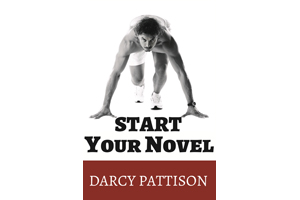One of my favorite books on creativity is the book Art & Fear by David Bayles and Ted Orland.

It’s a book I always go back to when I’m struggling with revisions or staying consistent with my writing.
Here are a few of the gems that I wanted to share with you from this invaluable book:
In large measure becoming an artist consists of learning to accept yourself, which makes your work personal, and in following your own voice, which makes your work distinctive.
Art is a high calling — fears are coincidental. Coincidental, sneaky and disruptive, we might add, distinguishing themselves variously as laziness, resistance to deadlines, irritation with materials or surroundings, distraction over the achievements of others — indeed as anything that keeps you from giving your work your best show. What separates artists from ex-artists is that who challenge their fears, continue; those who don’t, quit.
Quitting is fundamentally different from stopping. The latter of happens all the time. Quitting happens once. Quitting means not starting again – and art is all about starting again.
Talent may get someone off the starting blocks faster, but without a sense of direction or a goal to strive for, it won’t count for much. The world is filled with people who were given great natural gifts, sometimes conspicuously flashy gifts, yet never product anything.
In the end it all comes down to this: you have a choice…between giving your work your best shot and risking that it will not make you happy, or not giving it your best shot — and thereby guaranteeing that it will not make you happy.
If you’re on Twitter, you can also finds lots of inspiration and other quotes at #ArtandFear.

Now available!

Fear
No, don’t tell me what’s wrong with this novel. I don’t want to hear it. Minor problems? OK, I’ll fix those. But major structural, plot or character problems? Don’t tell me.
Cynthia Ozynick says, “Writing is essentially an act of courage.” When I get an honest critique, my courage fails me.
I fear the revision needed: I won’t ever be able to “get it right.” Obviously, I thought that I had communicated my intentions well in the first draft, or I would have changed it before you read it. But you say that you don’t understand, or that I’m inconsistent, or that I’m unfocused. How could that be? I see it so clearly. And if my vision of my story is so skewed, then how will I ever get it right?
I fear that you’re right and I’m wrong. But how can I be sure? This is my story and it comes from my psychological leanings, my background, my research. How can you tell me what is right for my story? If the story doesn’t communicate what I want, then, yes, I need to revise. I repeat: Obviously, I thought it did communicate what I wanted, or I would have revised it before you saw it. Do you just have a different vision of the story because of your psychological leanings, your background? Are you trying to envision what I intended, or are you envisioning what you would have written? Where does your ego slam up against my ego? And where does your objective appraisal need to push my ego back into line with what it really wants to do anyway? Perspective is hard to achieve.
I fear that all my hard work, all the months spent thinking and rewriting, will be wasted.
As a novelist, time haunts me. To write a novel isn’t the work of a week or a month. It takes many months, a year, a year and a half. More. It’s a long, long process. Your revision notes mean that the time is extended, and that without any guarantee of being finished even then. Meanwhile, that means that I’m a year older, that it’s a year in which I couldn’t write anything new (even if I could find the courage to begin again).
I fear your honesty; I need your approval (or someone’s approval; if not yours, then whose?). Will it crush me emotionally if you don’t “like” my story? I gloss over the approval part of critiques and agonize over the “needs work” assessment. Is there a way for you to only show approval, yet open my eyes, so that I recognize what needs work? I’d rather recognize it for myself than have it pointed out.
I fear that my standards are too lax. I want to be finished, I want to have this story out there. I want to have written, but in the throes of writing, I want the end of the process long before the story is really finished. Submission comes too early and then I get rejections. Then, it’s harder than ever to revise. But waiting is excruciating. Typical advice: Put the manuscript in a drawer for three months and then pull it out and read it with a fresh eye. What? Waste three more months? Never. It’s done and ready to send out. (Ok, maybe it isn’t, but I can’t stand looking at it one more time and in three months, my editor could read it and buy it. OK, maybe they won’t buy it until I revise, but three months? Isn’t there any other way?)
Critiques, especially honest and on-target critiques, are fearful things. I know that I need them; but they are painful, emotionally draining, and confidence shaking.
But I need them. OK, can you give me a minute? Let me find my mask of courage. There. I have it on. Now bring on your best critique!
More reading:
Other thoughts on critique of an artist and humility.
Art and Fear: One of my favorite books on the psychology of making art. It deals with fears about our unworthiness, fears of critiques, fears of displaying our art and much more.
Top 10 Ways to Stop the Sting of Critiques
Here are my slightly tongue-in-cheek Top 10 Ways to take the Sting out of Critiques!

Take the Sting Out of Critques!
- Avoidance: Have someone else read the critique for you and only highlight the good comments. Read only the highlighted comments.
- Revenge: Give the creep back an ever harsher critique than you just got.
- Denial: Write out the reasons why the critiquer is totally off base. Ignore all suggestions.
- Excitement: Fake excitement about the critique and tell everyone you know exactly what’s wrong with the story and how you plan to fix it.
- Suspicion: Read each comment with the suspicion that the critiquer is trying to get your manuscript out of the running, so their own manuscript will do well. Therefore, you can safely ignore any comments you want to.
- Surprise: Allow each comment to be a revelation at how far off base this critiquer is.
- Pride: Take pride in your ability to “take it” from the tough ones.
- Loneliness: Understand that you and you alone are in the situation of receiving harsh critiques; such things have never been written about any manuscript and will never be written again.
- Forgiveness: Realize that the critiquer has sinned by so harshly criticizing your story and at some point they will have to come and ask for forgiveness; be ready to give it gracefully.
- Hope: Find hope in the good things the critiquer noticed, and Hope in the process of revision.









Adding it to my Goodreads. As always, another brilliant recommendation! I think I’m about to start reading “Writing Is My Drink.” Have you read that one?
Yes! I love that book. One of my favorites last year. I have a favorite quote that a blogged about back in February: http://www.karen-strong.com/2015/02/11/trust-yourself/